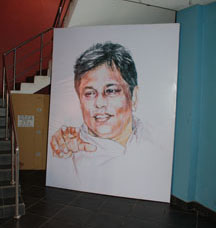On January 13, President Mahinda Rajapaksa told Sri Lankan media his government had no evidence to continue an investigation into the murder of Sri Lankan editor Lasantha Wickramatunga. Rajapaksa made this comment in response to a question raised by Lasantha’s brother Lal in the presence of about 60 media personnel, including editors, publishers and government ministers, at a customary monthly presidential breakfast.
Rajapaksa’s nonchalance over an investigation he himself publicly promised to initiate in the wake of the murder and amid allegations his government was involved, came just five days after Wickramatunga’s family and colleagues commemorated the prominent journalist’s second anniversary of his death.
It has been perhaps most indicative of the government’s attitude toward the murder that when Rajapaksa’s brother Gotabhaya Rajapaksa, the defense secretary and therefore the man who oversees the police, was asked about the inquiry by a foreign television station, he replied: “Who is Lasantha? A tabloid publisher. Why is the world worried about one man? He criticized everybody. So everybody had a reason to kill him.” As editor-in-chief of The Sunday Leader, Wickramatunga repeatedly challenged the government.
In the two years since Lasantha’s murder on January 8, 2009, the government has stonewalled the investigation while it has been passed around like a hot potato from one investigating body to another.
In January 2009, four police teams were assigned to the case, but apart from the arrest of a man suspected to have stolen Lasantha’s mobile phone, nothing went further until January 2010, when Rajapaksa found himself facing a formidable political opponent in former army commander General Sarath Fonseka in the presidential election. Six days after being re-elected to a second term, Rajapaksa ordered Fonseka’s arrest presumably out of fear he’ll turn into a whistleblower. The government media machinery also started to overtly point fingers at Fonseka as the hand behind Lasantha’s murder.
During the course of last year, seven soldiers belonging to the Sri Lankan army’s Military Intelligence Directorate–a unit headed by a close confidant of Fonseka–were detained for questioning by the Terrorist Investigations Department (TID) and the Criminal Investigations Department (CID). The seven soldiers were separated from an original 17 who were taken into police custody in such haste that the action was widely seen as political rather than genuine in nature. All 17 have since been released.
It is clearly not for lack of evidence that Rajapaksa–the commander-in-chief of the armed forces–now declares that there is no evidence to continue with the investigation.
Police have succeeded in taking into custody five mobile phones, which on the day Lasantha was killed, moved in the same pattern as his phone. Police say the phones that passed through 11 cellular phone towers that day have not been used before or since the day of the killing. However, they have not been disconnected either. According to police, one of the five phones appears to have been used to monitor and control the entire operation. A track path of the calls made between the five telephones indicates that they communicated regularly with each other, constantly calling one particular mobile. One of the five phone numbers indicated on the mobile path shows a call having been made from the spot Lasantha was attacked. According to witnesses, the assassins all rode a uniform make and type of motorcycle. A motorcycle allegedly used in the attack has been recovered.
Had there been even the slightest political will to solve this murder the apprehension of his murderers would have been child’s play.
It is not that the investigating arms in Sri Lanka are incompetent. Even if they needed additional international investigative and forensic expertise it would have been readily forthcoming. Instead, the police have been content to file more than 50 mindless reports on the case merely to satisfy legal requirements while the judiciary too seems to have allowed this absurdity to flourish. The case meanwhile has been shifted from the local police to the CID and finally to the TID.
It is indeed a reflection of the exasperation Lasantha’s own former newspaper feels, with the investigation degenerating into an exercise in hypocrisy and cover up–that they too have lost interest in the court proceedings, even withdrawing legal representation on their behalf.
And it is a sad tribute to Sri Lanka’s growing indifference to democratic principles, rule of law, justice and fair play, and the present regime’s subversion of democratic institutions, that Lasantha’s murder remains unsolved. Lasantha Wickramatunga was a journalist, opinion maker, and activist, but firstly he was a citizen of Sri Lanka. A society that cannot hold responsible those who commit murder upon their own citizens is a failed society.
